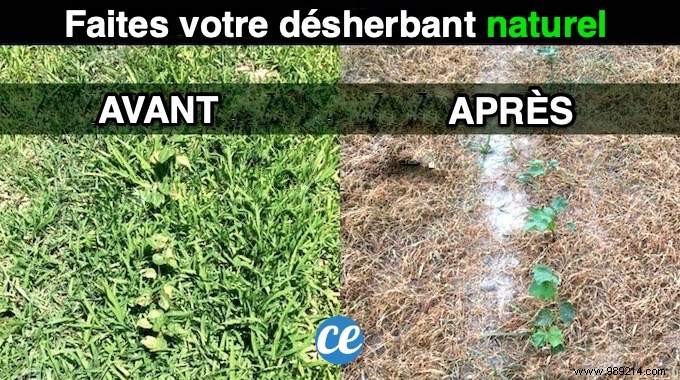
You use products containing glyphosate and other harmful substances to weed the garden ?
Stop this practice immediately! I'll show you how to weed it naturally.
Because yes, no chemicals are needed to remove weeds from the garden.
The proof, I haven't used it for a long time and my garden is perfect!
To tell you the truth, I only use homemade weed killers and the results are radical.
Discover 8 natural tips for weeding a garden without danger. Watch:
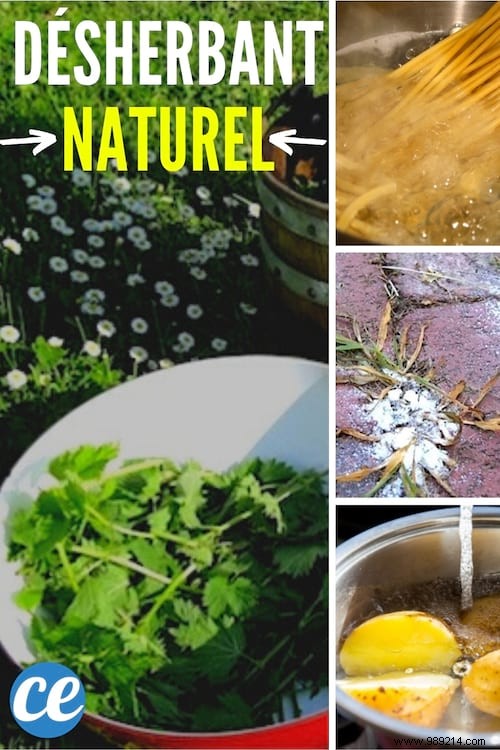
Before giving you our tips for homemade weed killers, know one thing.
Some plants are often considered weeds when they are not.
From their scholarly names "weeds", these so-called weeds are essential for biodiversity.
These wild plants are home to insects and pollinators necessary for the balance of a healthy green space.
Take for example the red cutter or white pimpernel .
These plants eat up excess nitrogen stored on your plot.
Or ravenelles .
They look for potash in the ground that cannot be absorbed by other plants.
And they enrich the soil when potash is released and broken down.
Of course, just because these plants have their uses doesn't mean they have to be everywhere.
But instead of using chemicals, use a good dose of homemade weed killer instead!
When talking about a chemical, glyphosate first comes to mind.
This product should simply be banned from your environment!
The WHO considers it a "probable carcinogen", while the IARC defines it as an "endocrine disruptor".
These herbicide products are harmful and very bad for our organism.
And I'm not talking about the devastating effect on the environment...
Using chemicals puts everyone at risk.
Individuals in the first place, but also domestic animals.
As for insects and micro-organisms, the effect is devastating.
Small birds are not left out; they are gradually disappearing from our towns and villages.
And the list goes on...
Our health is directly impacted by these harmful products.
Chemical weedkillers create pollution both in the air and in groundwater.
Come on, I'll stop the bad news there and give you some good news!
Watch how to naturally weed your garden .
The methods are simple and anyone can apply them.
They are also effective on a vegetable garden, a flower bed or for your paths and terraces.
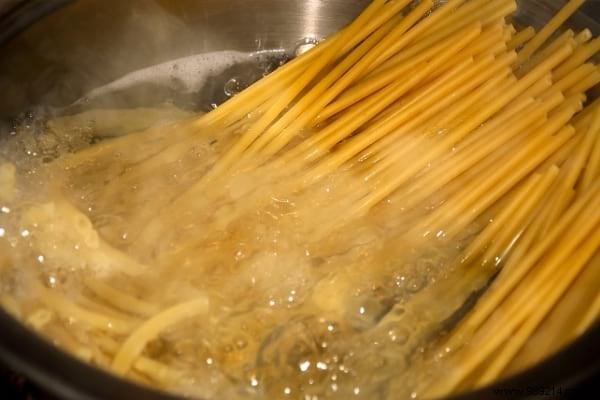
Do you have small tufts of grass growing between the slabs of your terrace or in your walkways?
To get rid of it, pour the hot pasta cooking water over it (salted or not).
Yes yes, you read that right. Hot pasta cooking water is a perfect weed killer.
The starch in the pasta attacks the weeds and the salt eats the roots.
You only have to pour the water at the base of the weeds without splashing the good vegetation around.
Be careful though, if the water contains too much salt, you can also destroy biodiversity!
Discover the trick here (point N°14).
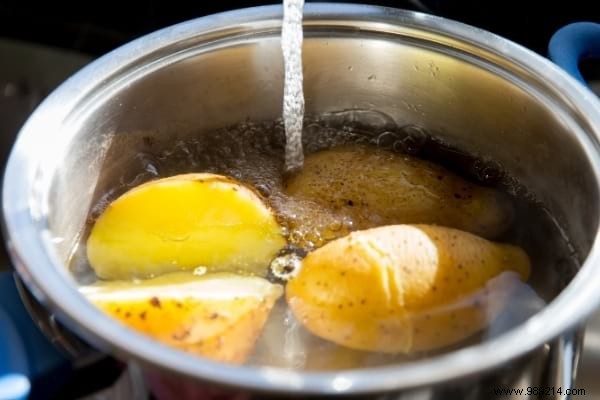
Another method to weed driveways, courtyards and terraces, is to use the cooking water from the potatoes.
Saturated in starch, this water is a perfect natural weedkiller.
As with the pasta water, pour the hot potato water over the weeds.
The only precaution to take:do not touch the other plants nearby.
Apart from that, the result is 100% guaranteed and safe.
Check out the trick here.

Angelica manure is intended to weed flower beds, vegetable gardens, etc.
Ok, but what the angelica manure are you going to tell me?
Well this manure (also called fermented extract) is a kind of liquid mixture made from plants.
The good thing about this manure is that it is simple to make and very inexpensive.
In addition, it can be used as a phytosanitary product in your green space.
That is, it can heal, protect and help your plants grow.
To make angelica manure, nothing could be simpler.
Take 1 kg of angelica leaves and 10 liters of water (use rainwater, it's free!).
Then proceed like this:
- Roughly cut the angelica leaves
- Store the leaves in the sun in a bucket with 10 liters of rainwater
- Leave to macerate for about 10 days; the potion is ready when no more bubbles appear in the liquid.
- All you have to do is filter and put it on the weeds to make them die!
Once the grass turns yellow, you can then uproot it.
Last thing.
It is possible to grow angelica in your green space, in pots or planters.
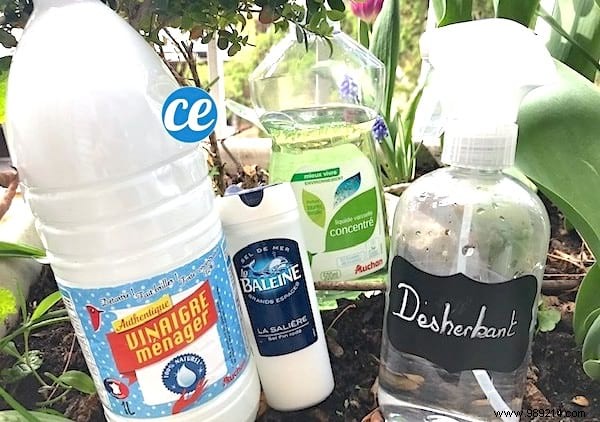
Vinegar is effective in your driveways, patios, and any uncultivated ground space.
If white vinegar is a powerful weedkiller, it is thanks to its acetic acid compound.
Generally, store-bought vinegars contain around 10% acetic acid.
White vinegar is what is called a contact weed killer.
That is to say, it only burns the aerial parts with which it comes into contact (not the roots therefore).
Vinegar also has the characteristic of being rapidly biodegradable.
But poured in too large quantities in your flowerbeds or vegetable garden, it could deteriorate the microbial life.
So don't be too heavy handed when using it.
Also note that there are many combinations of homemade weed killer based on white vinegar.
For example, white vinegar diluted with water :
- You can prepare a 50% water / 50% white vinegar solution
- Spray this solution on the weeds or pour it directly on them.
Apply this method rather in the morning when the weather is fine (the sun multiplies the effects of the vinegar).
White vinegar and black soap:
To make the vinegar stick better to the weeds, make a solution with black soap.
It disappears less quickly in rainy weather, for example.
- Pour 2 teaspoons of black soap for 1 liter of white vinegar in a spray bottle.
- Shake and spray weeds on sunny days.
A high temperature allows vinegar residue to dissipate better in the air.
The fertility of the land is thus safeguarded.
Check out the trick here.
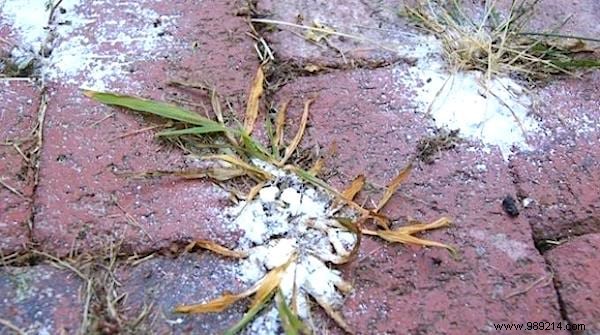
It is probably not the best known herbicide, yet baking soda is an excellent weedkiller.
Another nice benefit, it slows the regrowth of weeds.
It exterminates unwanted weeds from 1% concentration, just like salt.
Bicarbonate is perfect for treating patios, driveways and any uncultivated ground space.
- Treat 1 square meter of soil with 10 g baking soda (4 level teaspoons).
- Sprinkle the baking soda directly on the surfaces to be weeded.
- No need to water, dew does the job perfectly when it comes to breaking down the grains of bicarbonate.
- On the other hand, put some baking soda in case of heavy rain.
- Apply this method once or twice a year, preferably in spring and/or autumn.
Check out the trick here.
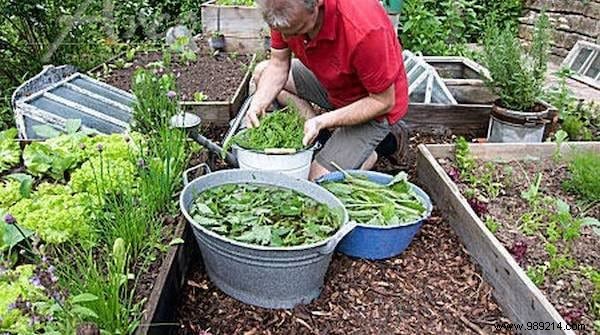
Nettle manure is effective for weeding flower beds, vegetable gardens, etc.
Like its cousin, angelica manure, nettle manure is a very effective and ecological herbicide. .
It is prepared as follows:
- Take 2 kg of nettles and 10 liters of water (if possible rainwater).
- Cut the leaves into small strips and soak them in water.
- Leave to macerate between 3 and 7 days, turning the mixture once a day.
The potion is ready when no more bubbles appear in the liquid.
- You just have to filter and put it on the weeds to get rid of them.
Check out the trick here.
Be careful, the nettle manure decoction emits a very strong smell.
I therefore advise you not to prepare it below the kitchen window!
Bonus tip.
Once the manure has been filtered, keep the leftovers to combine with your compost.
This allows substances to be broken down more quickly.
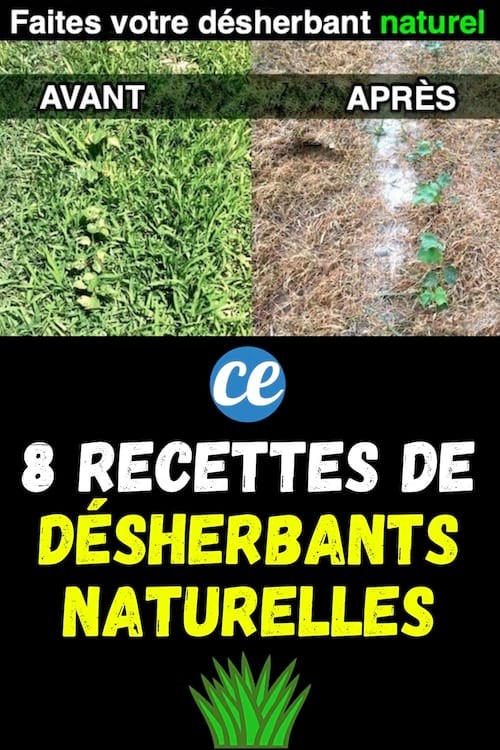
Nature gives everything it takes to preserve our flowerbeds, plants and shrubs.
Be aware that some plants attack weeds and destroy them effectively.
They are called "green manures".
- Phacelia, clover, mustard, etc.
These plants have the advantage of growing quickly by creating a large mass of foliage and roots.
These green manures being quite invasive, they leave no room for the growth of weeds.
- Buckwheat
The roots of this green manure inhibit the growth of weeds.
It is also called the "cleansing" plant.
- Marigold, marigolds and marigolds
These green manures develop substances that quackgrass and weeds hate!
More generally, all organic gardeners use these natural methods to protect their crops.
Planting green manures next to other plants has indeed only advantages.
It is not only a natural fertilizer, but also a natural herbicide.
So think about sowing green manures between flower plants and shrubs.
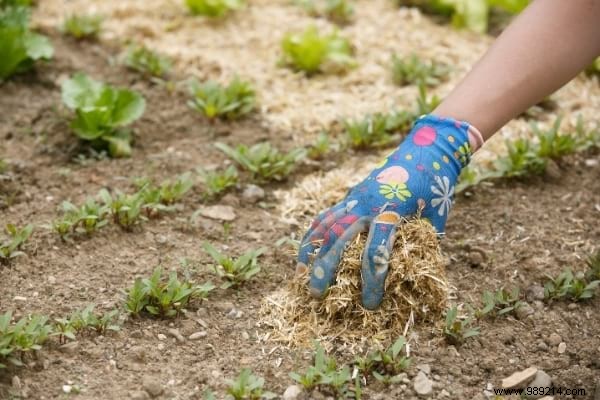
To prevent weeds from invading your vegetable gardens and flower beds, there's nothing like a good mulch.
For this to work, first pull out the weeds and level your soils.
Then you can put the mulch; this allows to greatly reduce the proliferation of weeds.
There are several methods of mulching.
- Organic mulches with straw, flax, grass clippings or dried grasses, hemp fibres, etc.
- Mulches with recoverable elements such as wood chips, shards of terracotta, slates, tiles...
Prefer to do your mulching outside of cold periods, therefore rather from spring.
If you do it in the summer, don't forget to water your floors before covering it!
- After turning your soil, cover with about ten cm of mulch.